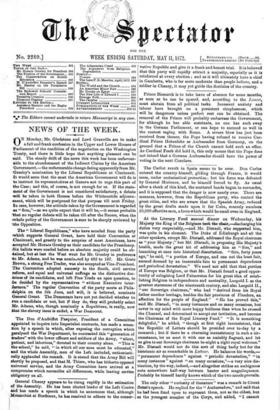At the Literary Fund annual dinner on Wednesday, his Majesty
the King of the Belgians took the chair,—discharging his duties very respectably,—and Mr. Disraeli, who supported him, was quite in his element. The Duke of Edinburgh and all the other speakers, except Mr. Disraeli, addressed the Royal chairman as "your Majesty ;" but Mi. DIsra,eli, in proposing His Majesty's health, made the great hit of addressing him as "Sire," and launching at once into historical dissertation. "Sire, forty years ago," he said, "a portion of Europe, and one not the least fair, seemed doomed by an inexorable fate to permanent dependence and periodical devastation." We need not add that that portion of Europe was Belgium, or that Mr. Disraeli found a good oppor- tunity of eulogising Lord Palmerston for his great idea of estab- lishing Belgium in independence and neutrality, Leopold I. as the greatest statesman of the nineteenth century, and also Leopold H., "our Sovereign chairman," who had "derived from his Royal father another heritage, besides the fair provinces of Flanders, an affection for the people of England." "He has proved this," said Mr. Disraeli, "in many instances and on many occasions, but never in my mind with more happy boldness than when he crossed the Channel, and determined to accept our invitation, and become the Chairman of the Royal Literary Fund." "It is something delightful," he added, "though at first sight inconsistent, that the Republic of Letters should be presided over to-day by a monarch ; but if there be a charming inconsistency in such a cir- cumstance, let us meet it with one as amiably flagrant, and let us give to our Sovereign chairman to-night a right royal welcome." Mr. Disraeli would not do this sort of thing badly but for the histrionic air so remarkable in Lothrur. He balances his words,— " permanent dependence" against "periodic devastation," "in many instances" against "on many occasions,"—a very nice dis- tinction, by the way, indeed,—and altogether strikes an ambiguous note somewhere half-way between banter and magniloquence. Probably he himself hardly knows which of the two moods prevails.


































